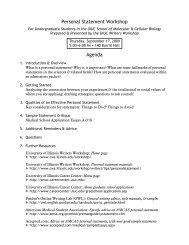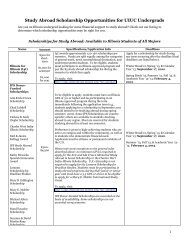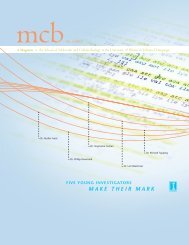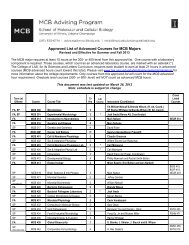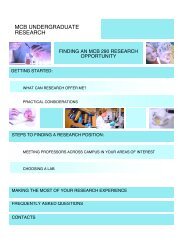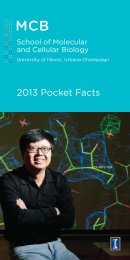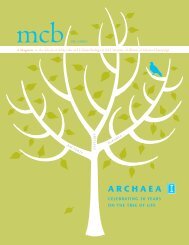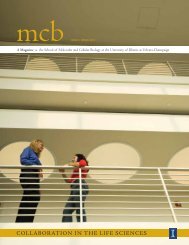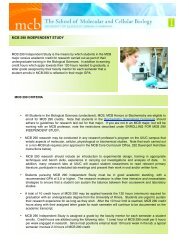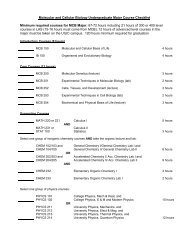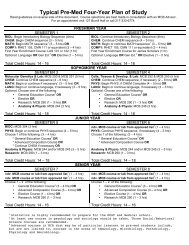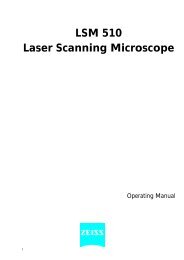breast cancer research • mcb as pre-med - The School of Molecular ...
breast cancer research • mcb as pre-med - The School of Molecular ...
breast cancer research • mcb as pre-med - The School of Molecular ...
You also want an ePaper? Increase the reach of your titles
YUMPU automatically turns print PDFs into web optimized ePapers that Google loves.
to <strong>med</strong>ical school<br />
and a degree in <strong>Molecular</strong> and cellular biology is one <strong>of</strong> the best roads to take.<br />
While the MCB undergraduate degree provides a strong academic foundation for a variety<br />
<strong>of</strong> careers in the health sciences — including academic and industrial <strong>research</strong>, dentistry,<br />
veterinary <strong>med</strong>icine, nursing, immunology, pharmaceuticals, forensics — <strong>pre</strong>paration for the<br />
Medical College Admission Test (MCAT) and <strong>med</strong>ical school is built into the curriculum.<br />
In fact, <strong>of</strong> the students admitted to <strong>med</strong>ical school from the University <strong>of</strong> Illinois at Urbana-<br />
Champaign in 2009, the majority graduated from the <strong>School</strong> <strong>of</strong> <strong>Molecular</strong> and Cellular Biology<br />
(majoring in MCB or biochemistry). <strong>The</strong> major with the next-largest number <strong>of</strong> matriculating<br />
<strong>med</strong>ical school students (the collected majors in the College <strong>of</strong> Engineering) sent one<br />
fifth <strong>as</strong> many students to <strong>med</strong>ical school <strong>as</strong> did MCB. <strong>The</strong> University <strong>of</strong> Illinois bo<strong>as</strong>ts a 49%<br />
acceptance rate for entering <strong>med</strong>ical school students — three points above the national average.<br />
As articulated in l<strong>as</strong>t year’s report (see sidebar), the <strong>med</strong>ical mind must do more than identify<br />
and treat dise<strong>as</strong>e: it must be multi-talented. <strong>The</strong> outstanding physician <strong>of</strong> the new millennium<br />
will be a well-rounded scholar with strengths in science, communication, technology,<br />
logic, and cultural sensitivity.<br />
According to Ronald Epstein and Ed Hundert, 1 “Competency is the habitual and judicious<br />
use <strong>of</strong> communication, knowledge, technical skills, clinical re<strong>as</strong>oning, emotions, values, and<br />
reflection in daily practice for the benefit <strong>of</strong> the individual and the community being served.”<br />
MCB courses teach both scientific content and competency in broader skills, for example<br />
writing, speaking, teamwork, <strong>research</strong>, and analysis.<br />
MCB — a 13-year-old school built on the University <strong>of</strong> Illinois’ long-standing tradition <strong>of</strong><br />
distinguished life sciences <strong>research</strong> and education — delivers a strong foundational curriculum<br />
while remaining agile and able to adapt to the breakneck pace <strong>of</strong> scientific discovery.<br />
A cutting-edge undergraduate program in a f<strong>as</strong>t-changing scientific field, MCB continually<br />
evolves to meet the needs <strong>of</strong> majors and their futures.<br />
In April 2010 the MCB Instructional Program unveiled a new two-semester lecture and lab<br />
course sequence in Human Anatomy & Physiology. <strong>The</strong>se courses will integrate human anatomy<br />
and physiology with pathology and dise<strong>as</strong>e processes from the organismal to the subcellular<br />
level. <strong>The</strong> streamlined design will provide our majors and non-majors with a superior,<br />
meaningful, integrated, and com<strong>pre</strong>hensive learning experience in anatomy and physiology.<br />
Another recent innovation is our expansion <strong>of</strong> the course “Genetics and Human Dise<strong>as</strong>e”<br />
under the leadership <strong>of</strong> Pr<strong>of</strong>essor Mary Schuler, providing important background to inherited<br />
dise<strong>as</strong>es and personalized <strong>med</strong>icine.<br />
With MCB’s opportunity for real laboratory training (see MCB issues 2 and 3), and newly<br />
redesigned anatomy, physiology, and genetics courses, the path to <strong>med</strong>ical school h<strong>as</strong> never<br />
been better paved. <strong>•</strong><br />
1 Epstein, Ronald and Hundert, Ed. “Defining and Assessing Pr<strong>of</strong>essional Competence.” JAMA. 2002;287:226-235.<br />
In MCB, we were ple<strong>as</strong>ed to see Scientific<br />
Foundations for Future Physicians, a 2009<br />
Report <strong>of</strong> the Howard Hughes Medical<br />
Institute and the Association <strong>of</strong> American<br />
Medical Colleges. We are in agreement with<br />
this report: our degree program fuses scientific<br />
rigor with a true liberal arts education.<br />
According to the report: “there is wides<strong>pre</strong>ad<br />
agreement that it is important to: (1) educate<br />
future physicians to be inquisitive; (2) help<br />
them build a strong scientific foundation for<br />
future <strong>med</strong>ical practice; and (3) equip them<br />
with the knowledge, skills, and habits <strong>of</strong> mind<br />
to integrate new scientific discovery into their<br />
<strong>med</strong>ical practice throughout their pr<strong>of</strong>essional<br />
lives and to share this knowledge with<br />
patients and other health care pr<strong>of</strong>essionals.”<br />
the report concludes: “A competency-b<strong>as</strong>ed<br />
approach should give...flexibility in the<br />
<strong>pre</strong><strong>med</strong>ical curriculum to allow undergraduate<br />
institutions to develop more interdisciplinary<br />
and integrative courses that maintain<br />
scientific rigor, while providing a broad<br />
and strong liberal arts education. Entering<br />
<strong>med</strong>ical students should be more evenly<br />
<strong>pre</strong>pared for the study <strong>of</strong> <strong>med</strong>icine, allowing<br />
<strong>med</strong>ical schools to spend less time teaching<br />
or reviewing the b<strong>as</strong>ic competencies and<br />
more time learning the growing scientific<br />
knowledge b<strong>as</strong>e needed to practice modern<br />
<strong>med</strong>icine.“<br />
SCHOOL OF MOLECULAR AND CELLULAR BIOLOGY . 3



